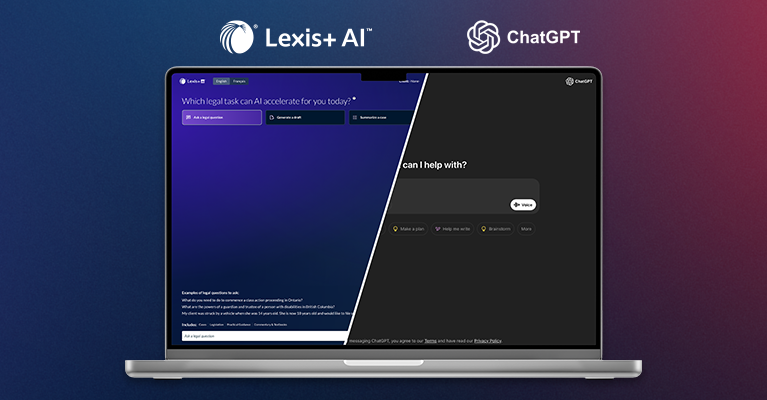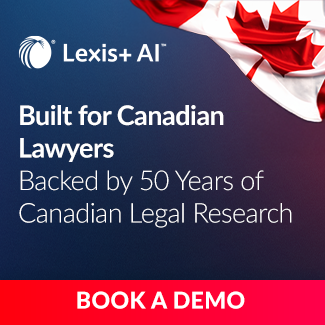Summary: As AI adoption accelerates across the legal industry, Canadian legal professionals are asking important and necessary questions about accuracy, data privacy, and reliability. This article...
In the legal world, the billable hour has long been the standard for measuring productivity and profitability. But as artificial intelligence (AI) continues to reshape industries, forward-thinking legal...
Discover the LexisNexis ® Trust Center — your trusted source for security, privacy, and compliance information across LexisNexis Legal & Professional solutions. The Trust Center brings everything together...
Summary: Understanding Shadow AI The Shifting Responsibilities of Leadership Recommended Actions to Tame Shadow AI Conclusion The fast growth of AI tools offers big opportunities but also...
In today’s fast-paced legal environment, the pressure to deliver high-quality, accurate documents quickly is greater than ever. Lexis+ AI is revolutionizing how legal professionals approach drafting, research...

Summary:
- Primary and Secondary Law
- Security, Privacy, and Trust
- Access to Authoritative Content
- Evidence Supported by Canadian Case Law
- Navigate Unfamiliar Issues
- Take Legal Action
- Quantum
- Draft a Statement of Claim
This post has been updated from the original to reflect the latest insights as of August 5, 2025.
In the dynamic setting of a dental office, a dental assistant finds herself in a troubling predicament. She reports being verbally abused, yelled at, and demeaned in front of both patients and colleagues by another staff member. Consequently, she experiences daily headaches, a loss of self-confidence, and sleep disturbances. Seeking justice, she turns to you, a lawyer, for representation in suing her employer and the offending staff member.
However, your expertise primarily lies in personal injury cases related to motor vehicle accidents, making this workplace bullying case unfamiliar territory. Despite your reservations, the necessity of acquiring new clients to sustain your billable hours motivates you to take on the case. But where do you start?
You've noticed the buzz around Artificial Intelligence (“AI”) and have heard mixed reviews about ChatGPT, leading you to consider it for your initial research. However, you're uncertain if it's the best choice given the ethical and client confidentiality concerns in your work. As you explore other legal AI solutions, you discover Lexis+ AI︎.
Why should you choose Lexis+ AI over ChatGPT?
Primary and Secondary Law
- ChatGPT can provide you with basic legal definitions for aggravated damages, punitive damages, and damages for mental suffering.
- Lexis+ AI provides you with much more than just definitions; it provides you with the most current case law sourced from LexisNexis Canada’s extensive database, as well as secondary sources of information ranging from legal encyclopedias to exclusive reputable leading textbooks.
Security, Privacy, and Trust
- ChatGPT poses significant privacy concerns when inputting prompts or client details as ChatGPT does not guarantee confidentiality, since it uses user data to train and improve its AI models. This means that any information shared with ChatGPT could potentially be stored and utilized in future iterations of the AI, raising ethical concerns about client confidentiality and data security. For legal professionals handling sensitive client information, this lack of privacy assurance makes ChatGPT a less suitable option compared to platforms that prioritize data protection and confidentiality.
- Lexis+ AI DOES NOT use or store your information, nor does it train it’s AI using your information. This allows you to take advantage of the AI system and ask specific questions that may include client details, WITHOUT having to worry about client confidentiality.
LEARN MORE HERE: Lexis+ AI Security Information
Access to Authoritative Content
In this case, you might consider including a claim for mental shock, but should you also include a claim for damages for constructive dismissal?
- ChatGPT tells you that you can bring a claim for both and mentions one case to support this conclusion. However, it does not hyperlink that case for your review, leaving you unsure if such a case exists and requiring you to do further research to seek out the case.
- Lexis+ AI’s response automatically includes hyperlinks to case law and tribunal decisions where, in this instance, Lexis+ AI states that courts have confirmed that damages for the tort of intentional infliction of mental distress can be awarded in the context of a wrongful dismissal action if it is established as an actionable wrong separate from the wrongful dismissal itself. This clarification is important because it means that even if the facts giving rise to the claim for mental distress overlap with those for constructive dismissal, the claim should not be dismissed solely on that basis.
Evidence Supported by Canadian Case Law
You then may want to know what evidence is necessary to prove intentional infliction of mental shock.
- ChatGPT provides you with three factors without providing case law to support this test: (1) flagrant and outrageous conduct; (2) intent to harm; and (3) visible and provable illness.
- Lexis+ AI provides a different test, supported by case law, to prove intentional infliction of mental shock: (1) an overt act by the defendant; (2) intention to produce harm; and (3) resultant nervous shock sustained by the plaintiff and consequent injury. The overt act must be flagrant and extreme, and intention can be proved by express statements or inferred from the facts. Moreover, the resultant injury must be a visible and provable illness or injury. As is self-evident this robust definition, supported by case law, will be much more persuasive in court. Lexis+ AI goes on to explain, supported by case law, that expert evidence is not strictly necessary to prove intentional infliction of mental shock, but it can be highly beneficial.
Navigate Unfamiliar Issues
Your third train of thought leads you to thinking that there might be a defamation claim, but you are unsure, as this is not your area of expertise.
- ChatGPT simply states that “public derogatory remarks by a co-worker could constitute defamation if they harm the individual’s reputation”.
- Lexis+ AI on the other hand, provides supporting case law and tribunal decisions that recognize, for instance, that yelling and calling someone incompetent can damage ones’ professional reputation, but not only must there be evidence that the statements are damaging but they also must be false.
Take Legal Action
You also may want to know whether you should sue not just the co-worker but also the employer.
Both ChatGPT and Lexis+ AI say that you should sue both parties. However:
- ChatGPT references one case involving vicarious liability
- Lexis+ AI in addition to the Supreme Court of Canada case, identifies two additional relevant cases and includes an Ontario Human Rights Code case as well, referencing a policy directive on Workplace Violence and Harassment Training.
The distinction is that Lexis+ AI provides you with a Supreme Court of Canada case regarding vicarious liability while ChatGPT does not.
Quantum
What about the quantum of damages your client might expect to receive?
- ChatGPT provides one case example where the harassing employee was ordered to pay damages for intentional infliction of mental suffering and punitive damages, and the employer was ordered to pay aggravated damages and punitive damages for a total award of $410,000.
While establishing the possible quantum of damages to be awarded to your client, might be appealing, but… - Lexis+ AI takes a much more cautious approach. It states that the client can expect to receive damages for defamation, intentional infliction of mental shock, and constructive dismissal, but the quantum of these damages will vary based on the specifics of each case. In respect of defamation, there is no upper limit, and the court will consider factors such as the extent of the publication and whether there was an apology retraction. For intentional infliction of mental suffering, damages are awarded based on the severity of the mental distress caused. Constructive dismissal claims typically involve compensation for lost wages and benefits, as well as damages for mental distress if the dismissal was particularly egregious. Lexis+ AI cites two tribunal decisions, allowing claims for constructive dismissal, defamation, and intentional infliction of mental suffering. Overall, Lexis+ AI states that the quantum of damages will depend on the specific circumstances of each case, including the severity of the defamation, the extent of the mental suffering, and the nature of the constructive dismissal.
Draft a Statement of Claim
- ChatGPT lacks the capability to draft a comprehensive Statement of Claim. This limitation is due to its inability to access and utilize specific legal precedents, case law, and detailed legal frameworks necessary for constructing a robust legal document. ChatGPT does not provide the depth of legal insight required to ensure that a Statement of Claim is well-supported and tailored to the nuances of a particular case.
- Lexis+ AI can significantly assist in drafting a robust Statement of Claim by providing easy access to precedent documents within the platform. This allows you to ensure that your claim is thorough, well-supported by legal precedents, and tailored to the specific circumstances of your case. By drawing from a vast database of legal materials, Lexis+ AI helps streamline the drafting process, saving time and enhancing accuracy.
While workplace bullying cases may initially seem overwhelming, Lexis+ AI offers the confidence and tools you need to navigate unfamiliar areas of law. With its comprehensive resources and advanced capabilities, you can feel assured in your ability to represent clients effectively, even in legal matters you may not have tackled before.
LexisNexis Canada empowers you to tackle new challenges with knowledge and clarity, making complex legal work more approachable and manageable.
Explore Lexis+ AI — now with ProtegeTM — for your practice by requesting a live demo.
This article is authored by Lynn Kirwin, Owner, LMK Mediation & Mentorship in collaboration with Peter Mangaly, Practice Area Consultant, Corporate & Public Markets, LexisNexis Canada.


